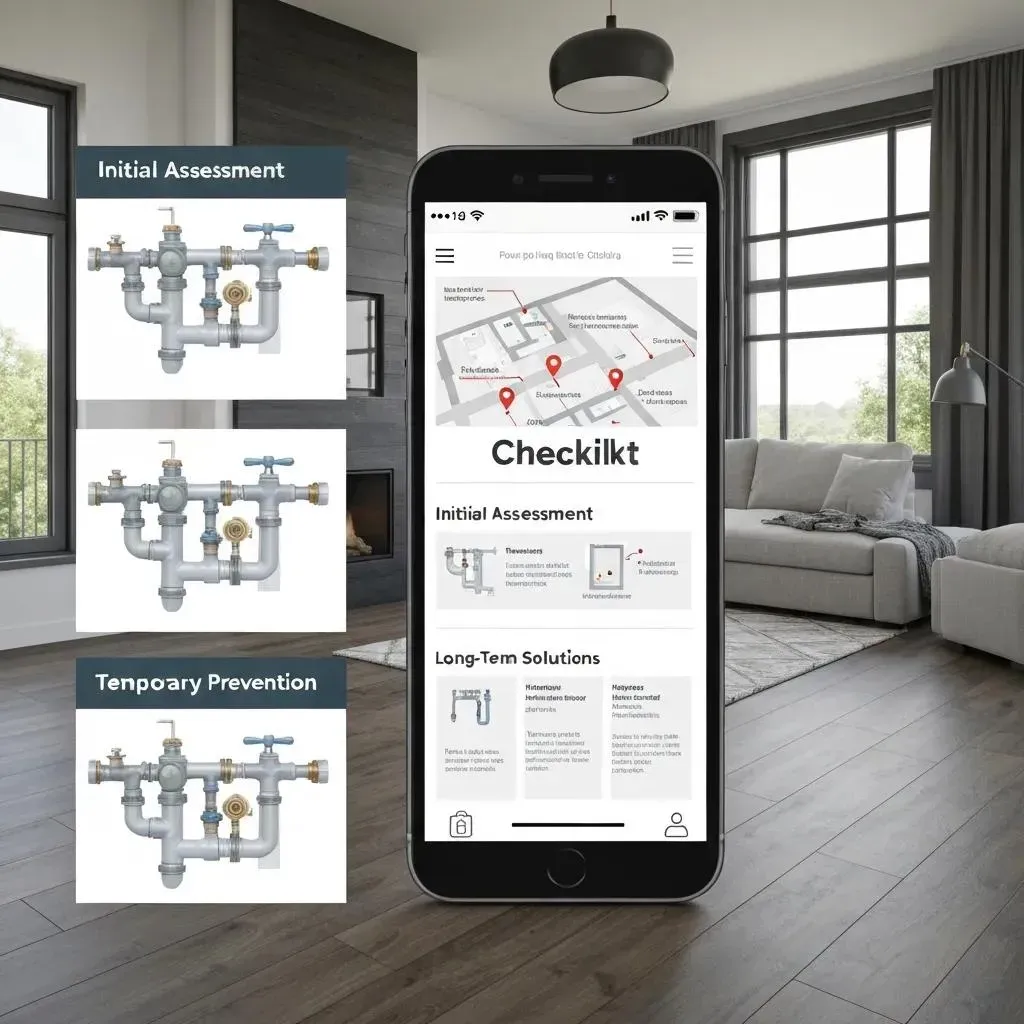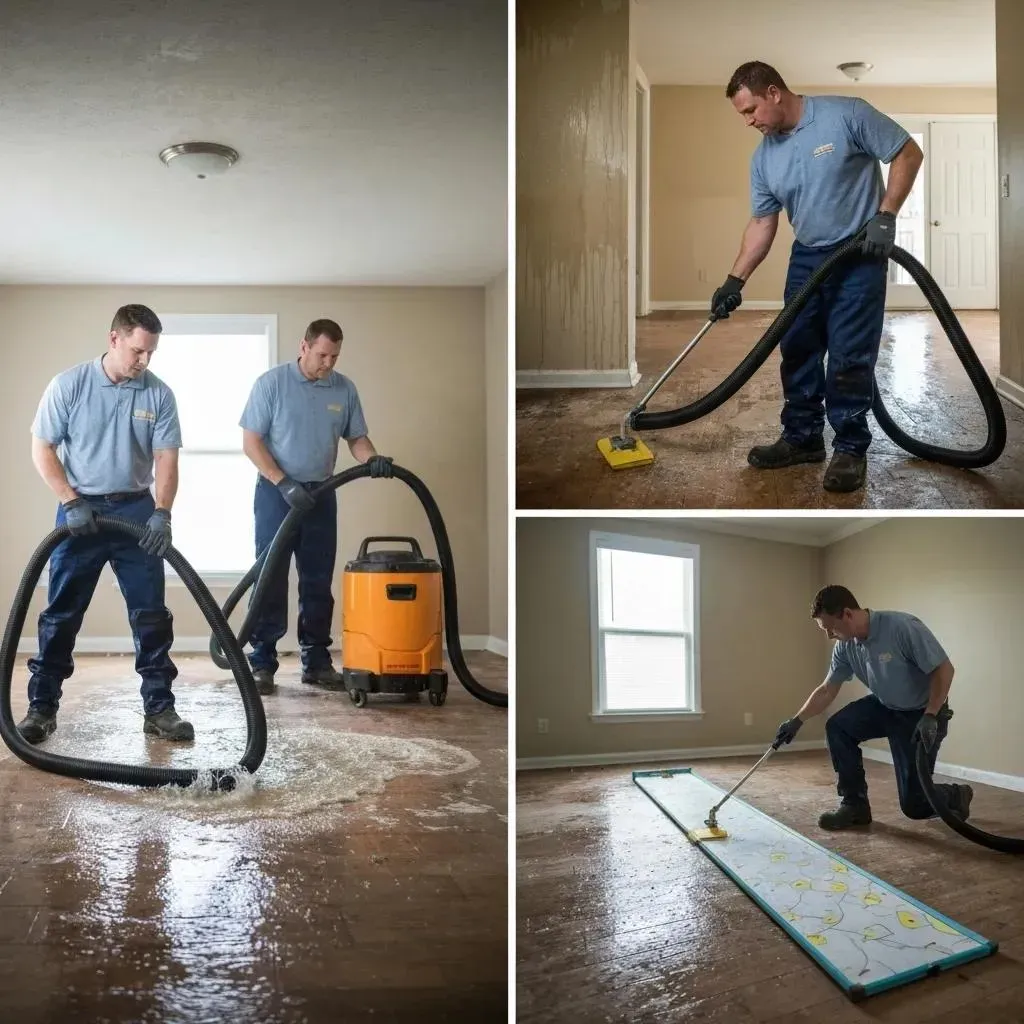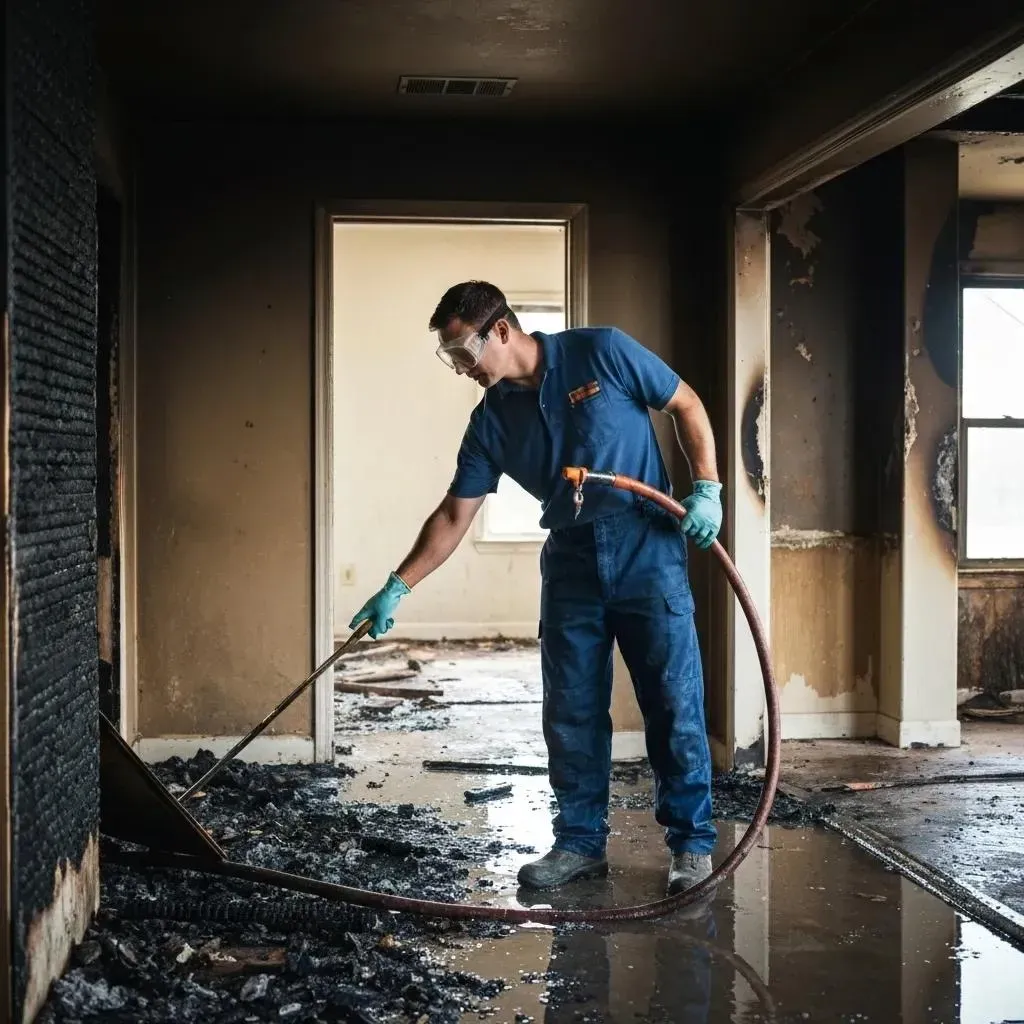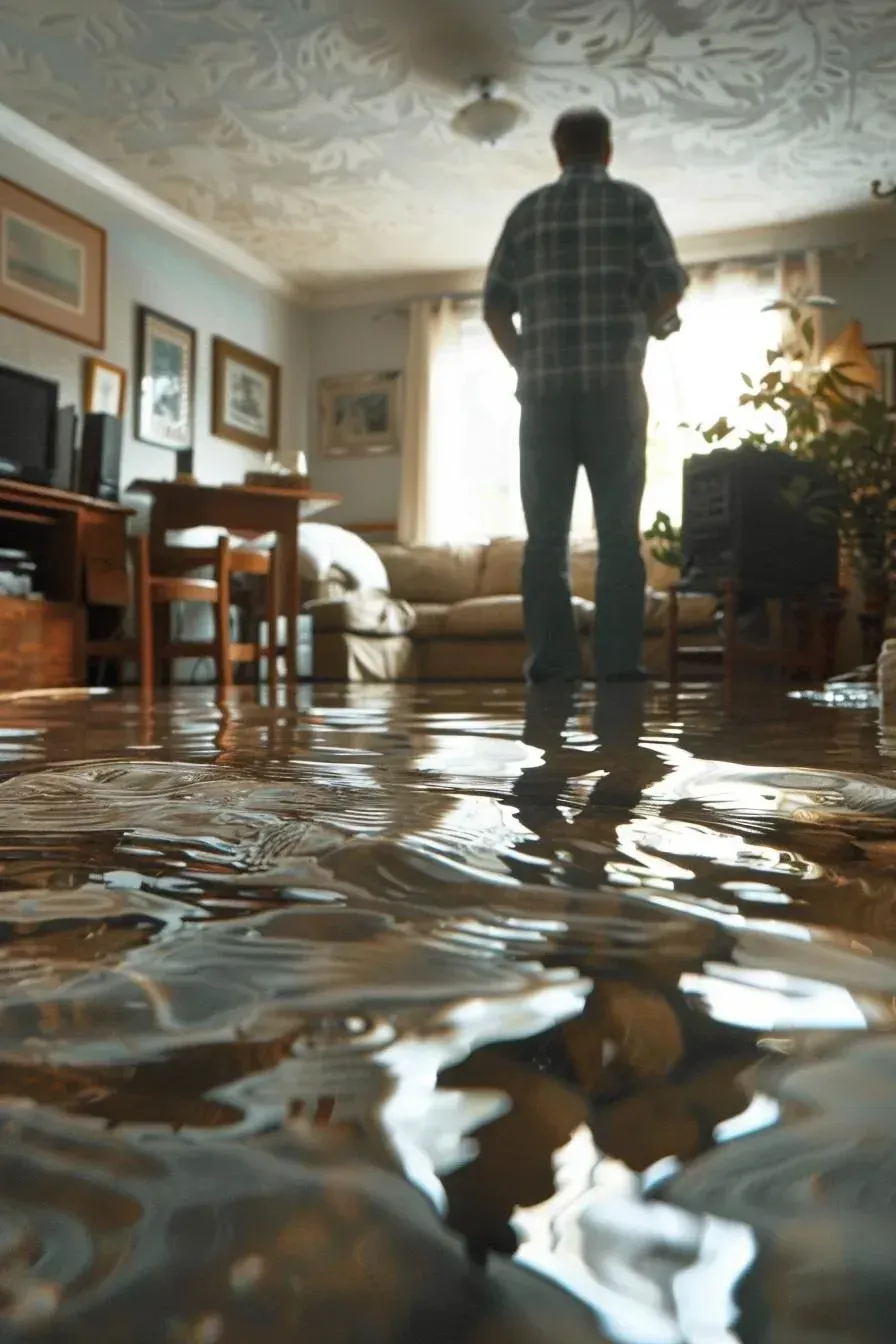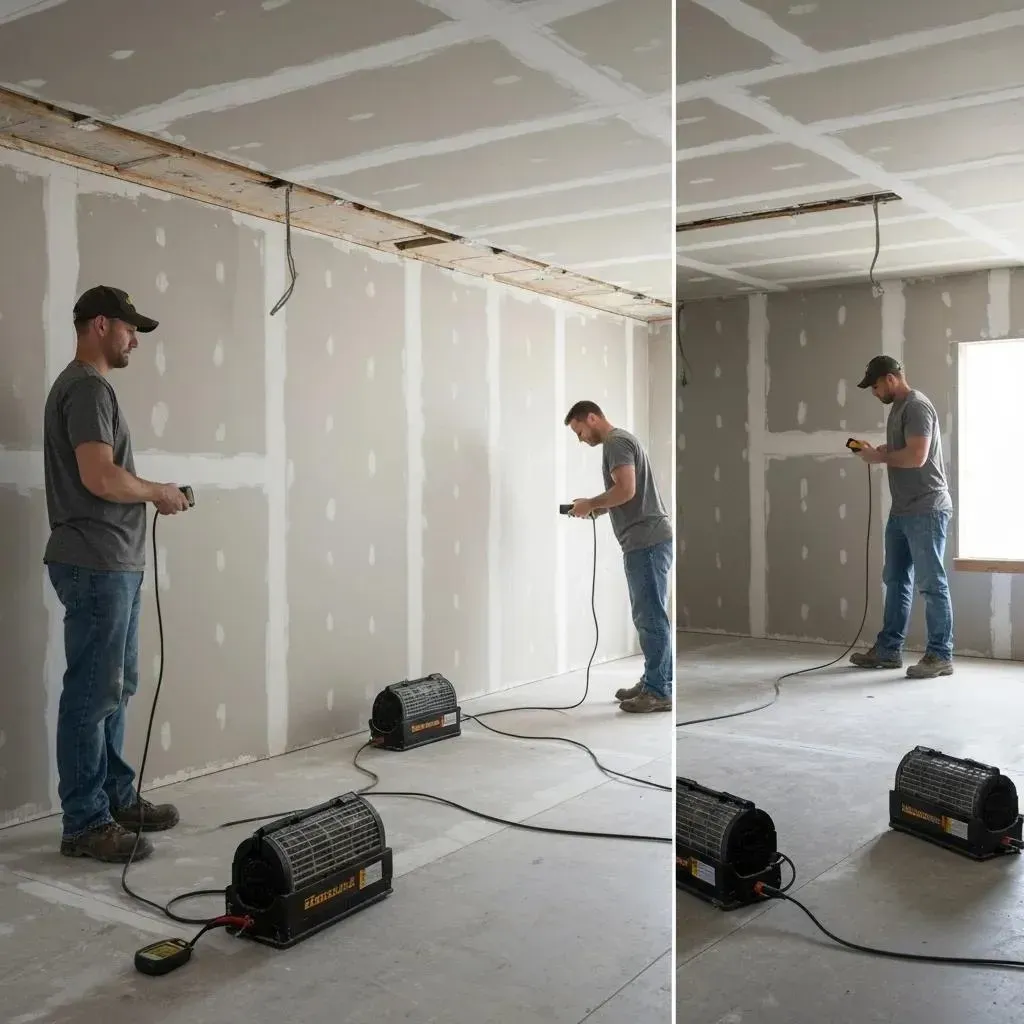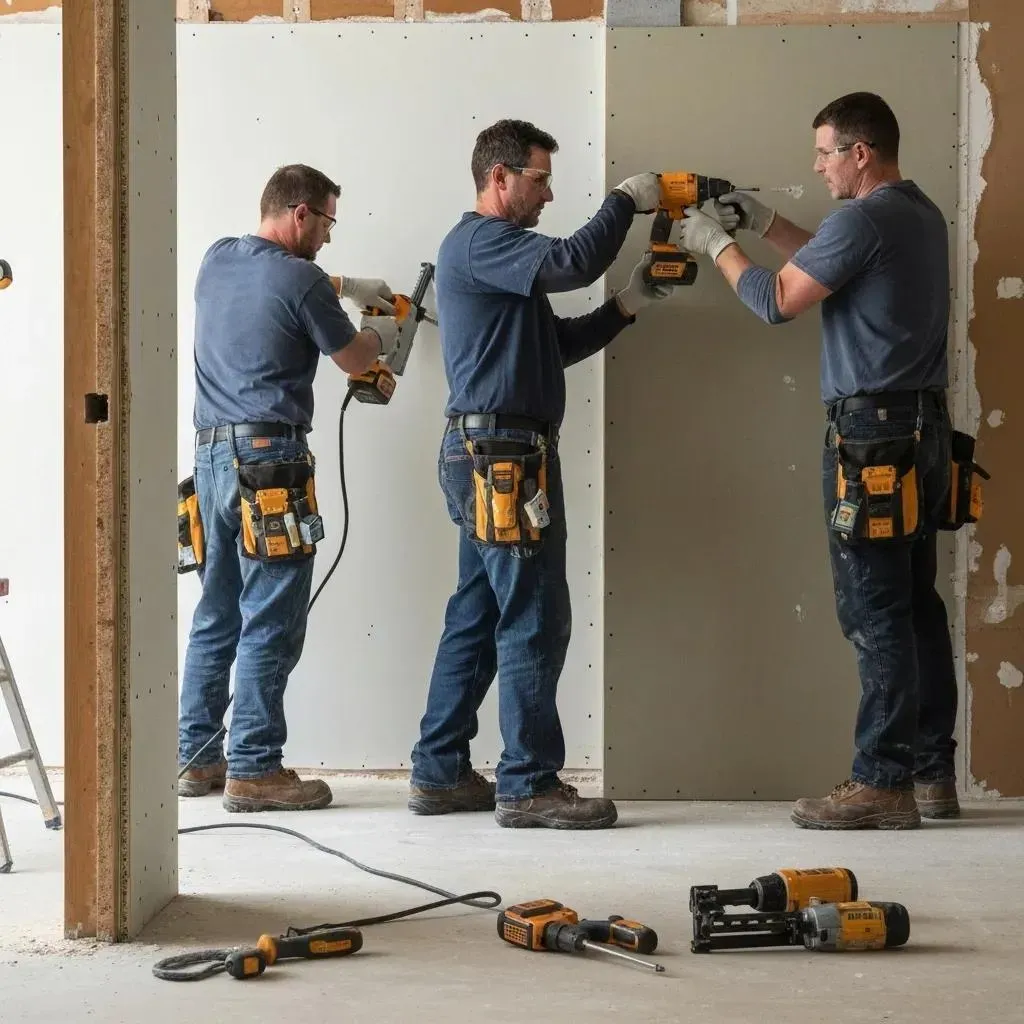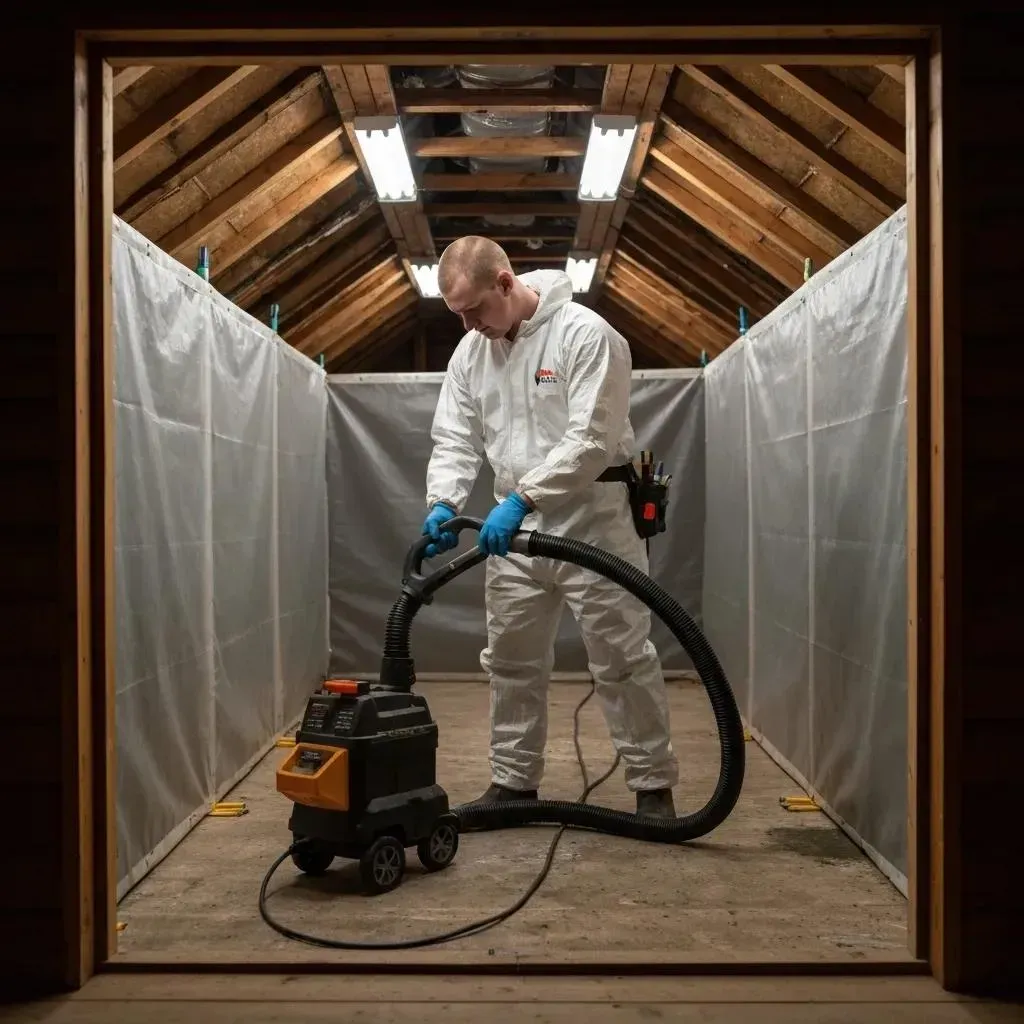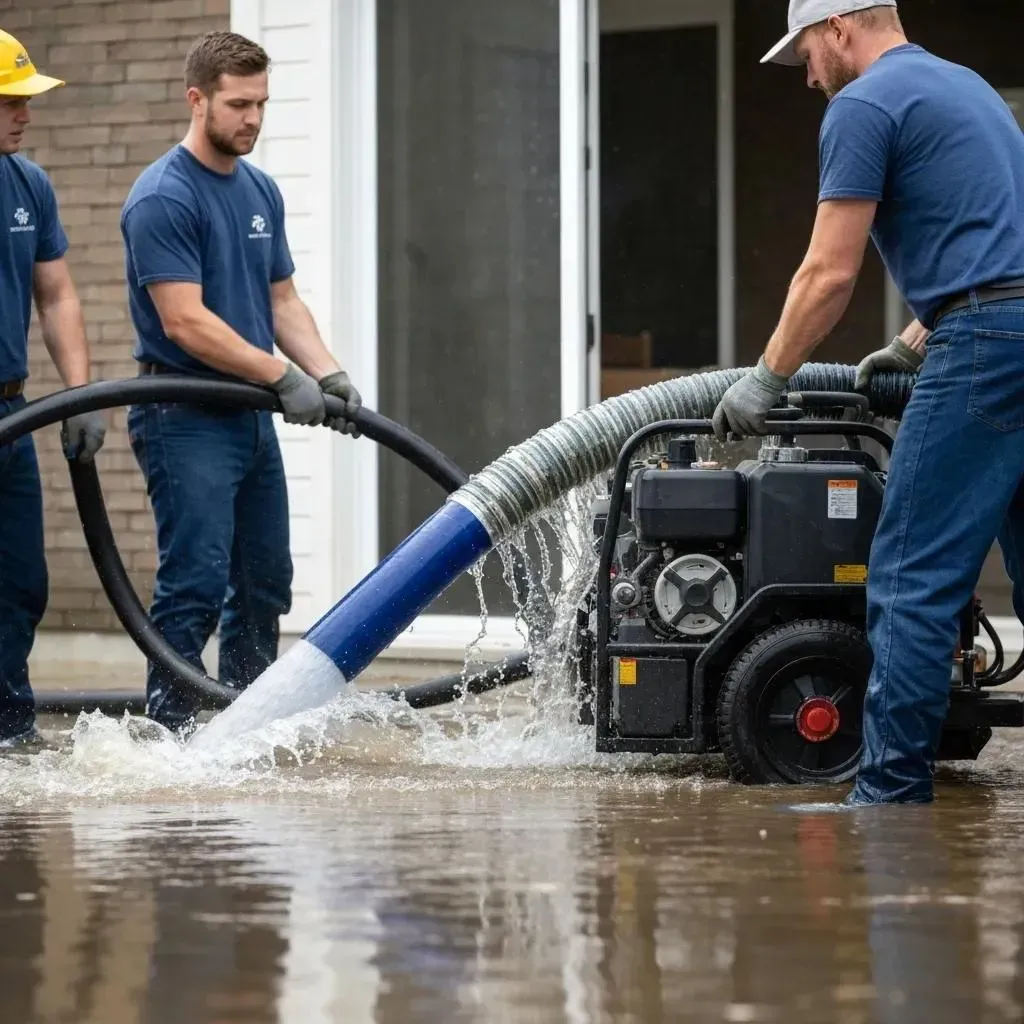Blog
Why Denver Homeowners Are Changing Their Basements
Basement finishing Denver projects have become one of the most popular home improvements in the metro area, and for good reason. Here's what you need to know:
Key Project Information:
• Professional contractors offer full-service restoration & remodeling
• Design centers available for planning your project
• Typical completion timeline: 6-8 weeks
• Projects starting around $36,335 for 850 sq ft
Average Costs: $20,000 - $75,000+ depending on size and features
Timeline: 6-8 weeks for most projects
ROI: 50-75% return on investment
Permits Required: Yes, for electrical, plumbing, and structural work
Denver's unique climate creates both opportunities and challenges for basement finishing. The Mile High City's dramatic temperature swings, from snowy winters to sunny summers, make basements ideal year-round living spaces. However, snow melt and seasonal moisture cycles require careful waterproofing and ventilation planning.
A finished basement can add an entire floor of living space to your home - often more cost-effectively than building up or out. With Denver's competitive housing market, that extra square footage translates to real value. Research shows basement finishing typically delivers a 75% return on investment for Denver homeowners.
But not all basement finishing companies are created equal. Poor moisture control, skipped permits, or inadequate egress planning can turn your dream space into a costly nightmare.
I'm Mike Martinez, owner of Accountable Home Services, and I've helped hundreds of Denver families steer basement finishing Denver projects from initial planning through final inspection. Our team combines restoration expertise with remodeling craftsmanship to create spaces that are both beautiful and built to last in Colorado's challenging climate.
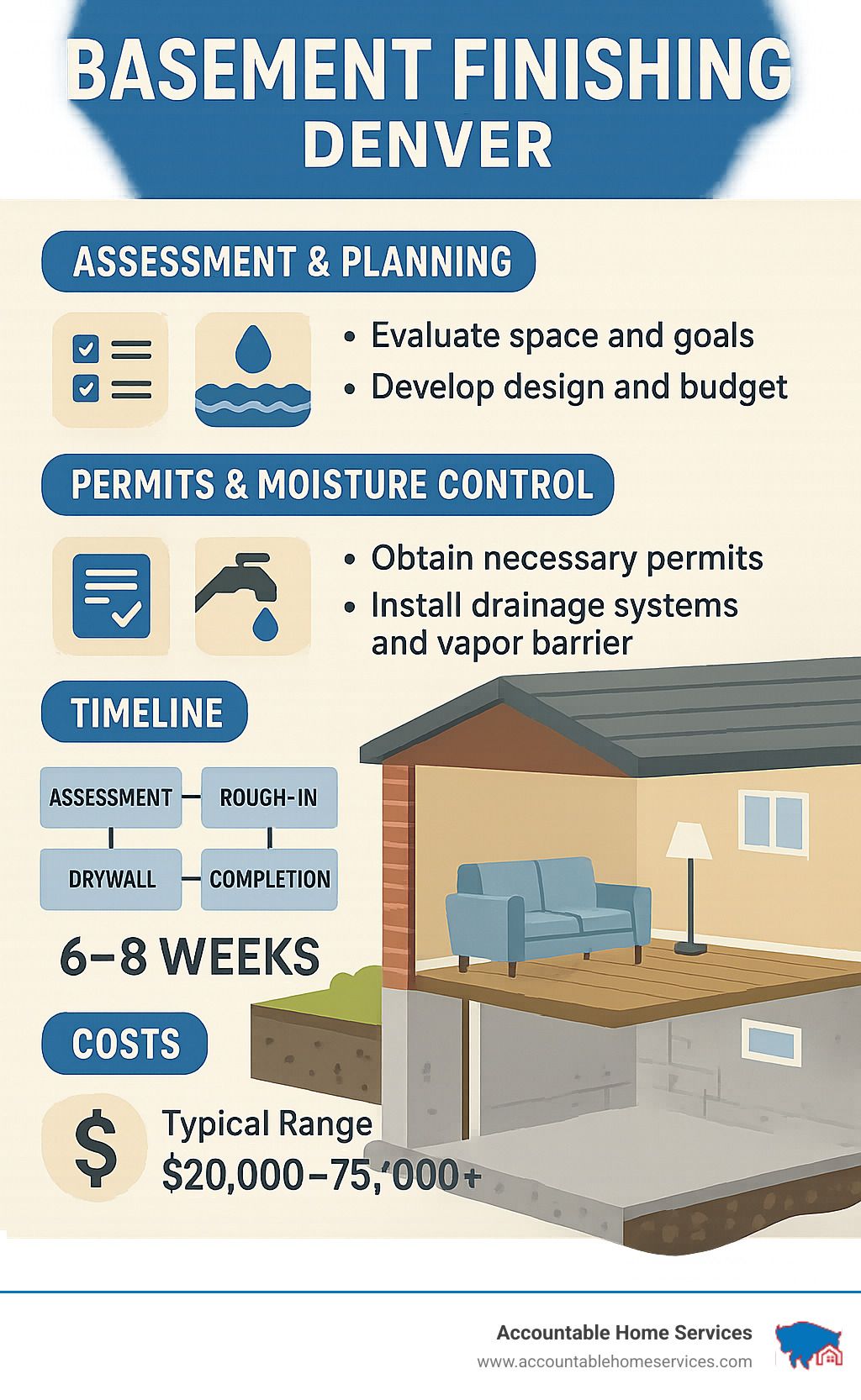
Why Basement Finishing Matters in Mile-High Conditions
Living at 5,280 feet above sea level isn't just about bragging rights – it creates some real challenges for your basement that most contractors don't fully understand. Denver's elevation brings rapid temperature swings that can make your basement feel like a different climate zone than the rest of your house.
Spring is when things get interesting. As our mountain snowpack melts, groundwater levels rise dramatically, putting serious pressure on foundation walls. I've seen too many beautiful basement projects ruined because the contractor didn't account for this seasonal moisture cycle. The moisture management strategies that work in Kansas definitely won't cut it here.
Our high-altitude climate also means materials behave differently. The dry air causes wood and drywall to expand and contract more than at sea level. Without proper planning, you might end up with cracked drywall and squeaky floors within the first year.
Then there's radon awareness – Colorado's geological conditions make radon mitigation systems a common requirement, not an afterthought. Our building codes reflect these realities with stricter energy efficiency standards and specific egress window requirements that can make or break your project's success.
The good news? When done right, a finished basement in Denver becomes your home's most comfortable room year-round. Cool in summer, cozy in winter, and protected from our intense UV exposure.
What Is "Basement Finishing Denver" Really About?
When we talk about basement finishing Denver projects, we're not just talking about slapping up some drywall and calling it done. True basement finishing means changing that concrete cave into legitimate living space that meets Denver's code compliance standards and habitable standards.
Your finished basement needs to check some serious boxes to be considered real living space. Ceiling height must hit at least 7 feet in most areas – no ducking under ductwork. If you're planning bedrooms down there, egress windows aren't optional; they're literally life-saving requirements.
The HVAC connections need to keep your new space comfortable year-round, while electrical systems must meet current code (not whatever was acceptable when your house was built). Moisture barriers and proper waterproofing protect your investment from Colorado's challenging climate.
Don't forget smoke and carbon monoxide detection – these aren't suggestions in finished basements. The whole process involves careful framing, electrical and plumbing rough-ins, insulation, drywall finishing, flooring installation, and trim work. Each phase requires inspections because cutting corners on code compliance will cost you big time later.
Top Benefits for Denver Homeowners
Added floor space is the obvious win, but the real magic happens when you see the numbers. You're essentially doubling your living area without expanding your home's footprint – and doing it for a fraction of what an addition would cost.
The 50-75% ROI on basement finishing consistently outperforms most other home improvements in Denver's market. Spend $40,000 on a quality finish, and you're typically looking at $30,000 to $50,000 in added home value. That's money you can count on when it's time to sell.
Cost-effective expansion makes basement finishing a no-brainer compared to building up or out. You already own the foundation, walls, and basic structure – you're just making it livable. No foundation work, no roof extensions, no major structural changes.
Denver's climate actually makes basements naturally comfortable spaces. They stay cool during our blazing summer days and are easier to heat when winter hits. That translates to energy savings and year-round comfort that your family will appreciate.
The resale appeal in our competitive market can't be overstated. Buyers consistently prioritize homes with finished basements, whether they need a home office, entertainment space, or potential rental income. It's the kind of feature that makes your listing stand out and helps justify your asking price.
Costs, Timelines & Return on Investment
Let's talk money – because that's probably what you're really wondering about. Basement finishing Denver projects can feel like a big financial leap, but when you break down the numbers, they often make more sense than you'd expect.
Here's the reality: most Denver homeowners spend between $20,000 and $75,000 on basement finishing, with the sweet spot falling around $35,000-$50,000. That might sound like a lot, but consider this – you're essentially buying an entire floor of your house for less than what many people spend on a new car.
Basic finishes (think simple rec room with carpet and drywall) typically run $20,000-$35,000. Mid-range projects that include a bedroom, bathroom, and living area usually land between $35,000-$55,000. If you're dreaming of something high-end with custom built-ins and premium finishes, expect $55,000-$75,000. And for those luxury spaces with wet bars, home theaters, and all the bells and whistles? You're looking at $75,000-$100,000 or more.
Most contractors quote between $25-$75 per square foot, though we typically see projects in the $35-$50 range. These estimates should include everything from permits and planning to the final walkthrough.
What really makes basement finishing attractive is the return on investment. While kitchen remodels might give you 60% of your money back, basement finishing consistently delivers 50-75% ROI in the Denver market. That $40,000 investment? It could add $30,000-$50,000 to your home's value.
Key Factors That Influence Price
Not all basements are created equal, and several factors can significantly impact your final cost.
Square footage is the obvious starting point – bigger spaces cost more. But here's something interesting: larger basements often have better per-square-foot pricing because of economies of scale.
Ceiling height can make or break your budget. Standard 8-foot ceilings are perfect. Anything under 7 feet creates code compliance headaches and potentially expensive excavation work. We've seen homeowners spend $15,000+ just to dig down a few inches.
Existing conditions in your basement matter enormously. Newer homes with good bones might need minimal prep work. But older Denver homes – especially those charming 1950s bungalows – often surprise us with outdated electrical panels, moisture issues, or structural quirks that need addressing first.
Plumbing additions are budget game-changers. Adding a simple half-bath might cost $8,000-$12,000. A full bathroom with shower? You're looking at $12,000-$15,000, especially if we need to install an ejector pump to handle waste removal.
Custom features are where costs can really climb, but they're also where you add the most personal value. Built-in entertainment centers, wet bars, fireplaces, or specialty lighting each add thousands to your project – but they also create those "wow" moments that make your basement truly special.
Material quality choices can easily double your material costs. Standard laminate flooring versus luxury vinyl plank versus hardwood – each step up increases cost but also increases durability and appeal.
Expected Project Timeline in Denver
Good news: most basement finishing Denver projects move pretty quickly once they get started. We typically complete projects in 6-8 weeks, though several factors can influence timing.
Weeks 1-2 focus on design and permits. We'll measure your space, develop plans, select materials, and steer Denver's permit process. This phase sometimes takes longer than expected – permit offices can be busy, especially during spring building season.
Weeks 3-4 are all about preparation and framing. We'll set up dust barriers to protect your living areas, rough in electrical and plumbing, frame new walls, and install insulation. The first inspection happens at the end of this phase.
Weeks 5-6 cover systems and drywall. HVAC connections, final electrical and plumbing work, drywall installation and finishing all happen now. This is when your basement really starts looking like livable space.
Weeks 7-8 bring everything together with finishes and final details. Flooring goes down, trim gets installed, walls get painted, fixtures go in, and we handle the final inspection and walkthrough.
Denver's weather can impact timelines, particularly during spring snowmelt when moisture levels spike. Smart contractors build buffer time into schedules for inspection delays and unexpected findies – because basements always have at least one surprise waiting.
The key is working with someone who understands Denver's unique challenges and won't rush through the moisture control steps that keep your investment safe for years to come.
The Step-by-Step Basement Finishing Process
Getting your basement finished doesn't have to feel overwhelming. When you understand what's coming next, you can plan better and feel confident about your investment. Here's how we approach every basement finishing Denver project from start to finish.
Every successful project begins with understanding what you're working with. We start by thoroughly examining your basement's current condition - checking for any moisture issues, evaluating the structural integrity, and identifying potential code compliance challenges. This isn't just a quick walkthrough. We're looking for signs of water damage, testing for radon (which is surprisingly common in Denver basements), and measuring everything carefully.
This assessment phase saves you money and headaches later. Finding a small moisture problem early means fixing it before it becomes a big expensive problem. We've seen too many basement finishing projects go sideways because someone skipped this crucial first step.
Once we know what we're working with, the permit process begins. Every legitimate basement finishing Denver project requires permits, and honestly, you want this protection. We handle all the paperwork for structural permits when we're modifying walls, electrical permits for new circuits and outlets, plumbing permits if you're adding a bathroom, and mechanical permits for HVAC connections.
The permit process typically takes 1-2 weeks, but it's time well spent. These permits ensure your project meets Denver's safety standards and can legally be included in your home's square footage when you sell.
Before any finishing work begins, we tackle moisture control head-on. Colorado's climate - with spring snowmelt, summer storms, and freeze-thaw cycles - creates unique challenges that many contractors don't fully understand. We might install or upgrade sump pumps, add interior French drains, apply waterproof coatings to foundation walls, install vapor barriers, or upgrade ventilation systems.
This moisture mitigation work isn't glamorous, but it's absolutely critical. Our restoration background has shown us what happens when this step gets rushed or skipped entirely.
With moisture protection in place, the exciting structural work begins. We're framing walls and ceiling soffits, running electrical wiring for all your outlets and lighting, installing plumbing for bathrooms or wet bars, adding HVAC ductwork for proper climate control, and installing insulation for energy efficiency.
This phase transforms your basement from a storage space into the bones of real living space. You can actually start to visualize how everything will look and function.
Multiple inspections keep everything on track and up to code. We schedule framing inspections, electrical rough-in inspections, plumbing rough-in inspections, and insulation inspections. Each one ensures we're meeting Denver's strict building standards.
These inspections might seem like delays, but they're actually protecting your investment. Passing inspections on the first try is something we take pride in - it shows we know what we're doing and follow proper procedures.
After passing all inspections, we move into the finishing work that makes your basement feel like home. We're installing and finishing drywall, completing painting and trim work, installing your chosen flooring, adding fixtures and appliances, and making final electrical and plumbing connections.
This is when your vision really comes to life. Watching bare framing transform into a beautiful, functional living space never gets old.
Permit & Safety Checklist for Basement Finishing Denver Projects
Denver's building codes exist for good reasons, and understanding them helps ensure your basement finishing Denver project goes smoothly. The city requires building permits for structural changes, electrical permits for new circuits, plumbing permits for bathrooms, and mechanical permits for HVAC work.
Safety requirements are non-negotiable and include egress windows for bedrooms with a minimum 5.7 square feet of opening, proper ceiling height of at least 7 feet in most areas, smoke and carbon monoxide detectors, GFCI outlets in bathrooms and wet areas, and proper ventilation to prevent moisture buildup.
Code compliance covers everything from stairway width and headroom requirements to handrail specifications, emergency lighting in windowless areas, and proper insulation R-values for energy efficiency.
More info about Basement Finishing Services Denver
Working with experienced contractors like our team at Accountable Home Services means you don't have to worry about navigating Denver's permitting process alone. We've been doing this for years and know exactly what inspectors look for. Getting permits right the first time keeps your project on schedule and protects your investment.
Moisture, Mold & Flood Protection Essentials
Denver's unique climate creates moisture challenges that absolutely must be addressed before finishing any basement. Spring snowmelt can raise groundwater levels dramatically. Summer thunderstorms dump water faster than soil can absorb it. Winter freeze-thaw cycles create pressure on foundation walls. Ignoring these realities leads to expensive problems later.
Sump pumps are essential for most Denver basements. We install high-quality systems with battery backup to handle power outages during storms. When the power goes out during a spring storm, your sump pump keeps working.
French drains collect groundwater before it enters your living space. These interior perimeter systems direct water to sump basins for removal. Think of them as insurance against groundwater intrusion.
Vapor barriers on foundation walls prevent moisture from transmitting through concrete. Even concrete that looks dry can allow moisture to pass through, creating humidity problems in finished spaces.
Whole-house dehumidifiers maintain optimal humidity levels year-round. They prevent mold growth and improve comfort. Colorado's dry air can be deceiving - basements often have different humidity levels than the rest of your home.
We use mold-resistant drywall, waterproof flooring, and antimicrobial treatments in moisture-prone areas. These materials cost a bit more upfront but save thousands in potential repairs later.
Scientific research on flooding confirms what we see every day - proper moisture control is essential for long-term basement health. Our restoration background gives us unique insight into moisture management because we've seen what happens when it's done wrong. We don't want to come back to fix water damage in your beautiful new basement.
Popular Basement Finishing Denver Design Ideas
Denver homeowners are getting wonderfully creative with their basement spaces, and the possibilities are almost endless. Home theaters top the list of popular requests. With Denver's entertainment culture and those long winter nights, dedicated movie spaces with tiered seating, surround sound systems, and ambient lighting create the ultimate escape.
Rental suites make financial sense in Denver's strong rental market. Creating legal rental units requires separate entrances, full kitchens, and complete bathroom facilities, but the rental income can help pay for the entire project.
Colorado's active lifestyle makes home gyms a natural choice. We install specialized flooring that can handle heavy equipment, improved ventilation for air quality, and electrical systems that support multiple machines running simultaneously.
Remote work has made home offices essential rather than optional. We create quiet, well-lit spaces with proper electrical infrastructure, dedicated internet connections, and soundproofing to keep work separate from family life.
Wet bars turn basements into entertainment destinations. These require plumbing connections for sinks, specialized electrical work for refrigeration, and thoughtful design for storage and serving areas.
Guest suites accommodate multi-generational living or frequent visitors. We design comfortable spaces with bedrooms, bathrooms, and sitting areas that feel welcoming rather than like afterthoughts.
More info about Basement Home Theater Setup
The key to any successful basement finishing Denver project is matching the design to how you actually live. We spend time understanding your family's needs and lifestyle before recommending specific features or layouts.
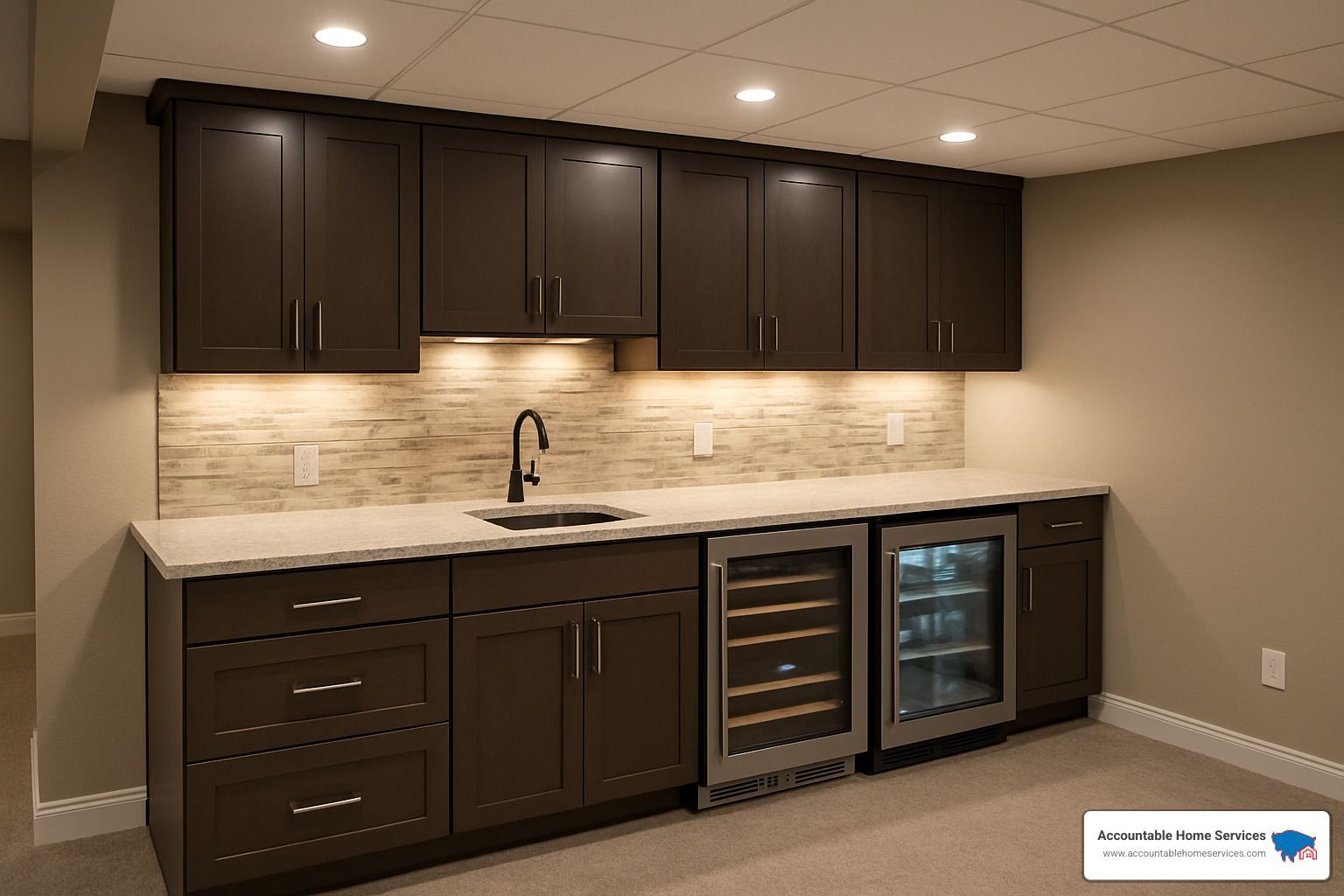
How to Choose a Contractor & Avoid Costly Mistakes
Choosing the right contractor for your basement finishing Denver project can make the difference between a dream space and a costly nightmare. After helping hundreds of Denver families steer this process, I've seen what happens when homeowners make the wrong choice – and it's never pretty.
The foundation of any successful project starts with proper licensing and insurance. Every legitimate contractor in Colorado must hold current state licenses and carry both liability and workers' compensation insurance. Don't just take their word for it – ask to see certificates and verify coverage independently. Unlicensed contractors might offer tempting low prices, but they're breaking the law and leaving you liable for accidents or poor workmanship.
Local experience matters tremendously in Denver's unique environment. Our altitude, climate swings, and specific building codes require contractors who truly understand Mile High conditions. A contractor who's successfully completed dozens of basement finishing Denver projects knows how to handle spring snowmelt challenges, radon mitigation requirements, and the permitting quirks that can delay inexperienced teams.
When evaluating contractors, dig deep into their portfolio and references. Quality contractors are proud of their work and maintain extensive photo galleries of completed projects. More importantly, they'll readily provide contact information for recent customers. If a contractor hesitates to share references or only offers projects from years ago, that's a red flag.
Communication style during the sales process reveals how contractors will behave during construction. Do they return calls promptly? Do they ask thoughtful questions about your goals and budget? Do they explain potential challenges clearly? Poor communication early on typically gets worse once work begins.
Insist on detailed, fixed-cost contracts that specify materials, labor, timeline, and payment schedule. Contractors who provide vague estimates or refuse to commit to firm pricing often rely on change orders to inflate costs later. While some changes are inevitable, they should be exceptions rather than the rule.
More info about Thornton Basement Finishing
Red Flags & Common Pitfalls
Some warning signs are so serious they should immediately disqualify a contractor from consideration. Suggesting you skip permits is not just a red flag – it's illegal. Unpermitted work creates insurance complications, makes future sales difficult, and puts your family's safety at risk. Legitimate contractors handle all permitting because they understand the liability involved.
Inadequate moisture assessment is another deal-breaker in Denver's climate. Contractors who don't thoroughly evaluate existing moisture conditions or dismiss waterproofing concerns are setting you up for expensive problems down the road. We've restored too many basements where corners were cut on moisture protection – the remediation costs far exceed what proper preparation would have cost initially.
Be wary of pressure tactics and unrealistic promises. Contractors who demand immediate decisions or large upfront payments are often struggling financially or using high-pressure sales techniques. Quality contractors stay busy through referrals and don't need to pressure customers. Similarly, anyone promising to finish your basement in 2-3 weeks is either inexperienced or planning to cut corners.
Vague estimates and verbal agreements create endless opportunities for disputes. Professional contractors provide written estimates that detail every aspect of the project. If they can't put it in writing, they probably can't deliver it reliably.
Interview & Comparison Checklist
The contractor interview process should feel like a professional consultation, not a sales pitch. During the initial meeting, quality contractors ask detailed questions about your lifestyle, budget, and long-term goals. They should identify potential challenges during their site visit and explain how they'd address them. Most importantly, they should demonstrate knowledge of Denver's specific code requirements and permitting processes.
The estimate process reveals a lot about contractor professionalism. Detailed written estimates specify material grades, brand names, and realistic timelines. Payment terms should be reasonable – avoid contractors demanding large upfront payments or full payment before work begins. Most legitimate contractors request modest deposits with the majority paid upon completion.
Contract review is where many homeowners make mistakes by focusing only on price. The scope of work should be crystal clear, with procedures for handling changes spelled out in advance. Warranty coverage should be detailed and substantial – we provide comprehensive warranties because we stand behind our craftsmanship.
Reference checking might seem tedious, but it's invaluable. Contact at least three recent customers and ask specific questions about communication, cleanliness, timeline adherence, and problem resolution. Most importantly, ask if they'd hire the contractor again. Happy customers are usually eager to share positive experiences.
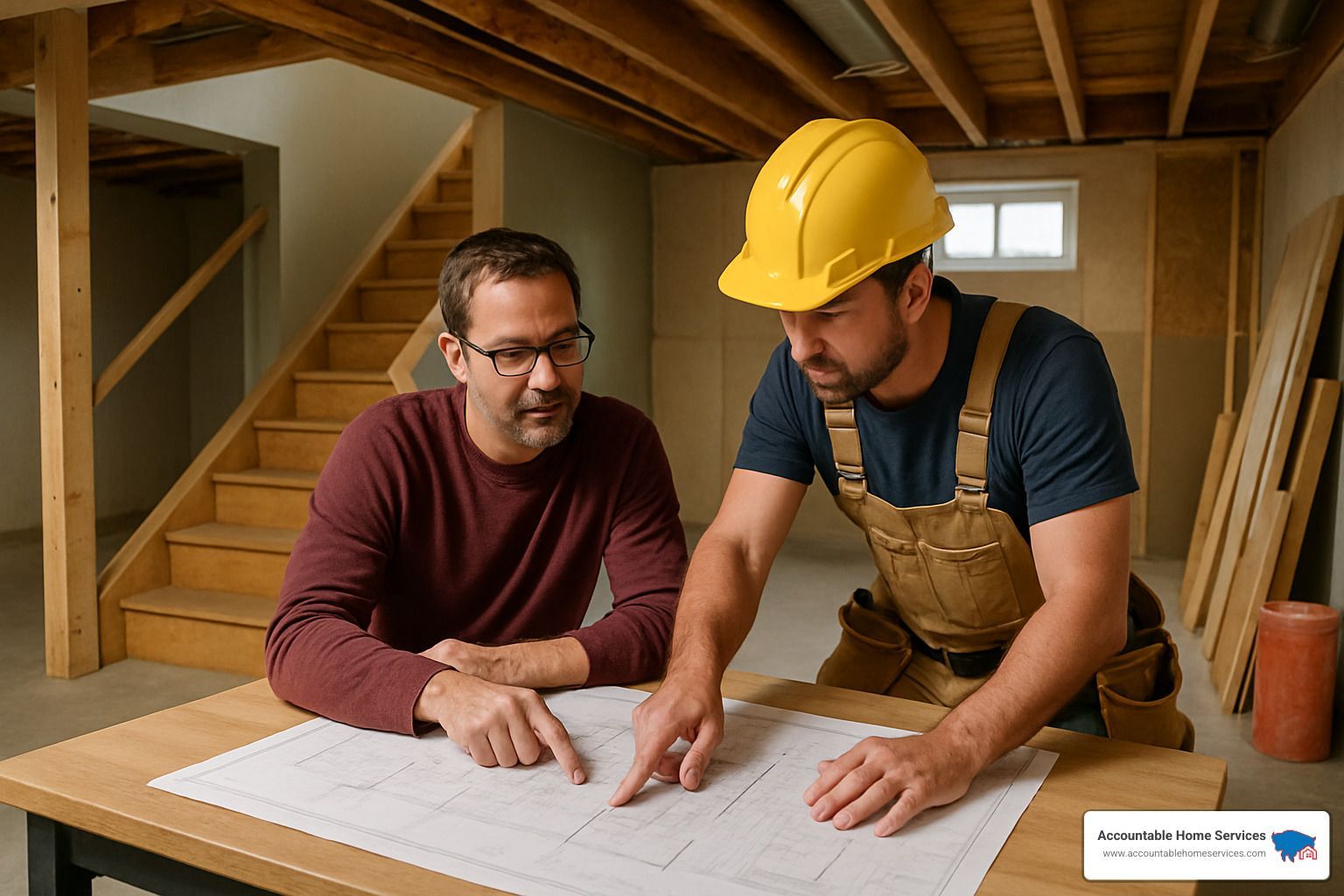
The lowest bid isn't always the best value. Quality materials, proper procedures, and skilled craftsmanship cost more upfront but save money and headaches over time. At Accountable Home Services, we've built our reputation on transparent communication, detailed planning, and delivering exactly what we promise. Your basement finishing Denver project deserves nothing less.
Living Through the Remodel & Post-Flood Restoration Integration
One of the most common questions we hear is whether families can stay in their homes during basement finishing Denver projects. The good news is that most families can remain comfortable upstairs while we work below.
Dust and Noise Management: We use plastic zipper walls and HVAC protection to contain dust and debris. Our crews work during normal business hours to minimize disruption to your family's routine. We also use low-dust cutting techniques and industrial air filtration systems.
Safety Considerations: We establish clear safety zones and ensure children and pets can't access work areas. All tools and materials are secured at the end of each day, and we maintain clean, safe pathways through the house.
Timeline Coordination: We coordinate our work schedule with your family's needs. If you have important events or need the space for specific dates, we build that into our project timeline.
Turning Past Water Damage into an Upgrade
Our unique position as both restoration and remodeling specialists gives us insight into turning past water damage into opportunities for improvement. If your basement has experienced flooding, the restoration process can actually be the perfect time to finish the space properly.
Restoration-to-Renovation Process:
- Damage Assessment: We evaluate what can be salvaged versus what needs replacement
- Moisture Elimination: Complete drying and antimicrobial treatment
- Structural Repairs: Fix any damage to framing or foundation
- Upgrade Integration: Install improved moisture control systems
- Finishing Work: Complete the space with flood-resistant materials
Insurance Coordination: We work directly with insurance companies to maximize coverage for both restoration and improvement work. Many policies cover upgrades to current building codes, which can help fund finishing work.
Resilient Material Selection: Having seen flood damage firsthand, we recommend materials that can withstand future moisture events:
- Luxury vinyl plank flooring instead of carpet
- Mold-resistant drywall in all areas
- Closed-cell foam insulation
- Waterproof paint and sealers
More info about Basement Remodel
Frequently Asked Questions About Basement Finishing in Denver
How much will finishing my basement increase my home's value?
This is probably the first question every homeowner asks, and for good reason. A well-executed basement finishing Denver project typically delivers a 50-75% return on investment. That means if you spend $40,000 on your basement finish, you can expect to see $30,000-$50,000 added to your home's appraised value.
The exact return depends on several key factors. Quality of finishes makes a huge difference – luxury vinyl flooring and custom built-ins will add more value than basic carpet and standard fixtures. Functionality matters too – bedrooms and bathrooms add significantly more value than simple storage or recreation areas.
Code compliance is absolutely critical for value. If your basement wasn't finished with proper permits and inspections, it can't legally be counted in your home's square footage. That's why we always handle the entire permitting process for our clients.
In Denver's competitive market, finished basements are incredibly desirable. Homes with quality finished basements typically sell faster and command higher prices than comparable homes without finished lower levels. We've seen clients who were initially hesitant about the investment become thrilled when they see both the immediate enjoyment and the financial return.
Can I stay in my house while the basement is being finished?
Absolutely, and most of our families do exactly that. We've perfected systems to make basement finishing Denver projects as non-disruptive as possible because we understand that your home is your sanctuary.
We install dust barriers using plastic zipper walls that seal off the work area from your living spaces. Our crews use low-dust cutting techniques and industrial air filtration systems to minimize airborne particles. We also cover HVAC vents to prevent dust from circulating through your home's ventilation system.
Noise is limited to normal business hours – typically 7 AM to 5 PM on weekdays. We coordinate our schedule around important family events, and if you have a special occasion coming up, just let us know and we'll plan accordingly.
Safety is our top priority, especially with children and pets. We establish clear safety zones and ensure all work areas are completely secured at the end of each day. All tools and materials are locked away, and we maintain clean, safe pathways through your house.
The main inconveniences are temporary construction noise during work hours and limited basement access. But most families find it's much easier than they expected, and the excitement of seeing daily progress makes any minor disruptions worthwhile.
What materials work best for moisture-prone basements?
This question is where our restoration background really shines. We've seen what happens when the wrong materials are used in Denver's challenging climate, and we've learned which products truly stand the test of time.
For flooring, we strongly recommend luxury vinyl plank because it's completely waterproof and looks fantastic. Polished concrete is another excellent choice when properly sealed. Ceramic and porcelain tile work well too, especially in bathroom areas. We always advise against carpet, hardwood, or laminate in basements – we've removed too much moldy flooring over the years to recommend these materials.
Wall materials need to handle moisture without supporting mold growth. We use mold-resistant drywall throughout basement projects and apply waterproof paint systems for added protection. In high-moisture areas like bathroom and utility rooms, fiber cement panels provide extra durability. Standard drywall and wood paneling are recipes for future problems.
Insulation choices can make or break a basement finish. Closed-cell spray foam is our preferred option because it acts as both insulation and vapor barrier. Rigid foam boards with properly sealed joints work well too. We never use fiberglass batts in basements because they can trap moisture and create perfect conditions for mold growth.
The key is combining smart material choices with comprehensive moisture control systems. We install sump pumps, French drains, and whole-house dehumidification to create the optimal environment for any materials. When moisture is properly controlled, your material choices can focus on aesthetics and comfort rather than just survival.
Conclusion
Your basement doesn't have to remain that forgotten storage space collecting dust and missed opportunities. Basement finishing Denver projects consistently deliver some of the best returns on investment in home improvement, often adding 50-75% of your project cost directly to your home's value while creating the extra living space your family actually needs.
The secret to a successful basement change lies in understanding Denver's unique challenges. Our high altitude, dramatic weather swings, and seasonal moisture cycles require contractors who truly know what they're doing. When moisture control is handled properly from day one, your finished basement becomes a comfortable, healthy space that your family will enjoy for decades.
At Accountable Home Services, we've built our reputation on getting these details right the first time. As a family-owned company serving Denver, Westminster, Thornton, Arvada, Boulder, Broomfield, Northglenn, Longmont, and Erie, we understand exactly what Colorado basements need to succeed. Our background in restoration gives us a unique perspective – we've seen what happens when shortcuts are taken, and we're committed to building spaces that last.
Whether you're dreaming of a cozy family room, a home theater for movie nights, or a rental suite to help with the mortgage, we're here to make it happen. Our certified technicians handle everything from initial design and permits through final inspection, using the same cutting-edge equipment and safety standards that have made us Denver's trusted restoration specialists.
The best part? Most families stay comfortable in their homes throughout the entire process. We take pride in keeping disruption to a minimum while delivering results that exceed expectations.
Ready to stop looking at your basement as wasted square footage and start seeing it as your home's greatest opportunity? Let's have a conversation about what's possible. We'll walk through your space, discuss your goals, and provide a detailed plan that fits your budget and timeline.
More info about our Denver services
Contact us today for your comprehensive consultation. Your dream basement is closer than you think.

